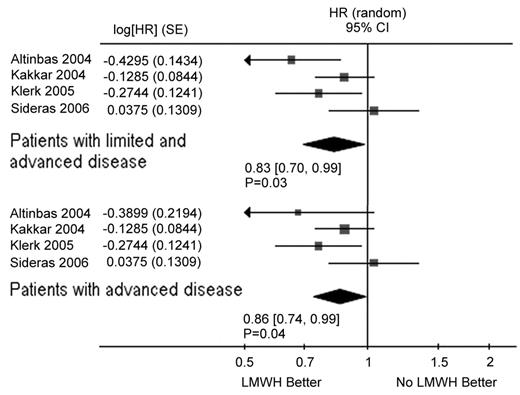Abstract
Several studies have supported the existence of an antitumor effect of anticoagulants and several MA of studies comparing unfractionated heparin and LMWH for treatment of venous thromboembolism have suggested that the risk of mortality in the subgroup of cancer patients receiving LMWH might be reduced; however other authors have reported contrary findings. We conducted a systematic review and MA of randomized trials comparing LMWH with placebo/no intervention studying as the main outcome the impact on survival in cancer patients. Data sources were Medline, EMBASE, HEALTHstar, Cochrane Library, and grey literature. Data extraction was done by one reviewer and verified by a second reviewer. Discrepancies were resolved by consensus. Main outcomes were death at 1 year and major bleeding episodes. Secondary outcome was death at 2 years. A MA was done using a DerSimonian and Laird random-effects model with odds ratio (OR) and relative risk (RR) as summary statistics. We conducted a MA of survival rates using censored end-points and a MA of hazard ratios (HR). If not reported, HR were extracted from the survival curves and pooled using the generic inverse variance method (random effects model). 283 potential references were identified and 7 were fully evaluated. Four studies which enrolled 898 patients with solid malignancies (the majority with extensive disease) were included; 3 of the 4 studies included previously treated patients. OR and RR of death are shown in the table.
Mortality in cancer patients receiving LMWH versus placebo/no treatment
| . | All Patients . | Patients with advanced disease . | ||||
|---|---|---|---|---|---|---|
| . | OR . | 95% CI . | P . | OR . | 95% CI . | P . |
| OR odds ratio; CI confidence interval; RR relative risk | ||||||
| 1-year mortality 0.70 | 0.49, 1.00 | 0.05 | 0.75 | 0.57, 0.99 | 0.04 | |
| 2-year mortality | 0.57 | 0.34, 0.96 | 0.03 | 0.59 | 0.42, 0.84 | 0.004 |
| RR | 95% CI | P | RR | 95% CI | P | |
| 1-year mortality | 0.87 | 0.77, 0.99 | 0.04 | 0.89 | 0.80, 0.99 | 0.03 |
| 2-year mortality | 0.90 | 0.84, 0.97 | 0.007 | 0.92 | 0.86, 0.98 | 0.02 |
| . | All Patients . | Patients with advanced disease . | ||||
|---|---|---|---|---|---|---|
| . | OR . | 95% CI . | P . | OR . | 95% CI . | P . |
| OR odds ratio; CI confidence interval; RR relative risk | ||||||
| 1-year mortality 0.70 | 0.49, 1.00 | 0.05 | 0.75 | 0.57, 0.99 | 0.04 | |
| 2-year mortality | 0.57 | 0.34, 0.96 | 0.03 | 0.59 | 0.42, 0.84 | 0.004 |
| RR | 95% CI | P | RR | 95% CI | P | |
| 1-year mortality | 0.87 | 0.77, 0.99 | 0.04 | 0.89 | 0.80, 0.99 | 0.03 |
| 2-year mortality | 0.90 | 0.84, 0.97 | 0.007 | 0.92 | 0.86, 0.98 | 0.02 |
The results of the survival meta-analysis showed that the pooled survival proportions at 1 and 2 years were 0.43 and 0.19 for the LMWH and 0.35 and 0.11 for the control group, respectively; differences were statistically significant (1 year p=0.018, 2 year p=0.001). The MA of HR is shown in the figure.
There was no increase in major bleeding episodes. Sensitivity analyses including only patients with advanced disease did not modify the findings; an analysis according to tumor type was not conducted due to a lack of information. LMWH improves overall survival in cancer patients independent of the stage. Additional trials are required to define the tumor types, disease stages, and dosing schedules most likely to derive the greatest survival benefit. Since the majority of patients included were previously treated, exploring the benefit of LMWH in newly diagnosed patients is necessary.
Disclosures: Use of low molecular weight heparin to improve survival in cancer patients.; Dr Rodger has received grant funding from Pfizer, Sanofi, Leo Pharma, Bayer and AstraZeneca.; Dr Rodger has received honoraria for educational sessions from Leo Pharma and AstraZeneca.; Dr Rodger has served on advisory boards for Pfizer, Sanofi and AstraZeneca.
Author notes
Corresponding author


This feature is available to Subscribers Only
Sign In or Create an Account Close Modal